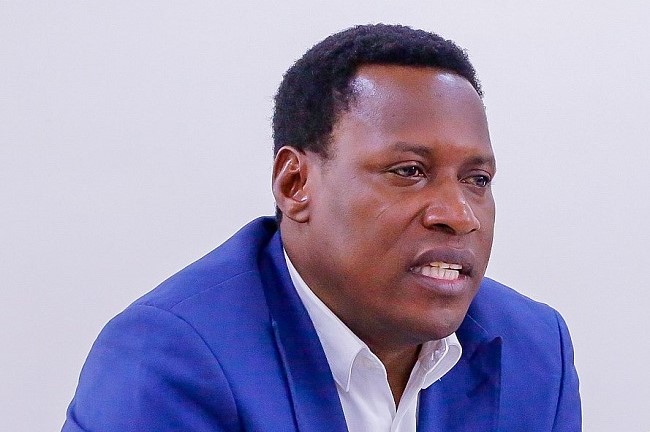The climate crisis impacts us in many ways, and my experience of this crisis is like that of many vulnerable Nigerians. Growing up in a confluence region and ministering as a priest across Nigeria, I have had the opportunity to meet and listen to voices that are not often heard in climate policy and diplomacy circles. Many marginal communities and individuals are forced to “manufacture” resilience to respond to the threats posed by the crisis.

Women who are unable to support their families because their crops have failed due to droughts or flooding, men forced to migrate due to extreme drought caused by disappearing water sources, and children with no access to clean drinking water. These are our people, especially poor suffering Nigerians, who are faced with climate impacts.
This ecological and climate crisis is more than just a scientific issue. It is a moral, spiritual, and ethical reckoning. It requires Ecoharmony – a way of living that honors the intrinsic value of all creation. The late Pope Francis’s landmark encyclical Laudato Si (Praise be to You) frames this crisis perfectly as: “care for our common home,” and everything within it is connected. The degradation we witness today stems not just from failed policies but from human greed and profound disconnection from nature.
Similarly, Saint Pope John Paul II warned of an “anthropological error” – the dangerous illusion that nature exists solely for our consumption. The truth is simpler and more profound: we are stewards, not owners. We are caretakers entrusted with the Creator’s masterpiece. But this isn’t a mere theology; it has practical implications for how we live, govern and care for the earth and for one another.
At the Kukah Centre, Interfaith Dialogue is at the core of what we do as we bridge Nigeria’s faith communities and faith and public leaders. We believe that an engaged citizenry is possible by advocating for inclusive initiatives and by serving as the mediating platform between the government, citizens, and communities. Similar work flourishes across other faith traditions: Al-Habibiyyah Islamic Society supports climate refugees, while in Cross River State, church leaders collaborate with women and traditional authorities to protect sacred groves from illegal logging. These are not isolated efforts but signs of a growing movement.
The Catholic Church offers a global structure capable of swift, coordinated action. Through Vatican Dicasteries, dioceses, religious orders, and lay networks worldwide, the Church is able to coordinate, encourage and implement environment focused practices from parish solar panels to ecological curriculum in schools. The first-ever Faith Pavilion at COP29 in Baku highlighted these possibilities and the Church’s expanding climate leadership. Catholic institutions’ ongoing divestment from fossil fuels, investment in renewable energy projects across dioceses worldwide, and grassroots initiatives aimed at mobilising parish communities are among the showcased faith-led solutions to protect both people and the planet.
Earlier this year, I joined diverse faith leaders from across Nigeria – Muslim clerics, traditional custodians, and Christian pastors – at the Interfaith Dialogue on Climate Change Summit, hosted by Connected Development (CODE). Despite our theological differences, we found a remarkable consensus: each of our faiths teaches that we are not masters of the earth but part of its sacred web. That care for creation is a sacred responsibility, rooted in divine command. From Sheikh Nurudeen Lemu’s teachings on khalifa – the Islamic call to stewardship – to ancestral African practices that honored the forests and rivers as sacred, we recognized that our religious traditions already carry the seeds of ecological wisdom.
The summit produced concrete recommendations for Nigeria’s government to integrate faith leaders into climate policy – not as peripheral voices, but as essential partners. The interfaith summit presented a foundational place for cultural and spiritual resonance needed to confront the reality of existing climate policies which often fail not because they are poorly written, but because they lack interfaith backing for larger acceptance.
This year, declared by the late Pope Francis as a Jubilee Year for Catholics all around the world – a sacred time of restoration, forgiveness, and renewed covenant with creation – we face a providential opportunity. Pope Francis’s recent passing left behind a profound environmental legacy. This Jubilee Year with its theme “Pilgrims of Hope,” encourages interfaith engagement and action on climate change, especially for those most vulnerable. What better moment for faith leaders to advance bold climate action?
This Year of Jubilee establishes heightened expectations for religious leadership, challenging Francis’s successors and leaders of all faiths to transcend rhetoric and implement concrete ecological commitments in their communities. It calls us to ecological conversion and systems change, to restore balance to our common home and relief to those suffering most from environmental degradation. The timing couldn’t be more apt for the rise of interfaith climate leadership.
Our faith compels us to amplify voices that power structures silence – not only human voices but also the wordless testimony of forests, rivers, and creatures that cannot speak for themselves. They too bear the Creator’s signature. Let our mosques, churches, temples and shrines become centres of environmental action. Let our prayers ignite a green awakening that transforms Nigeria and beyond.
The climate crisis may be the greatest moral challenge of our time. But I believe that faith – with its power to inspire, mobilise, and sustain – may also be its most powerful solution. The Jubilee Year of 2025 calls us to this sacred task with renewed urgency and hope – all rooted in interfaith collaboration.
By Rev. Fr. Atta Barkindo (PhD), Director, The Kukah Centre: Faith, Leadership and Public Policy
